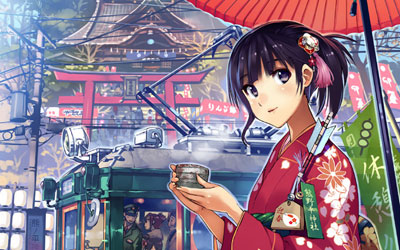
ã‚ã‘ã¾ã—ã¦ãŠã‚ã§ã¨ã†ã”ã–ã„ã¾ã™ï¼ Happy new year! Actually by my timezone it’s already almost the end of the first day of 2011 (actually exactly 1 minute left), but a huge chunk of my day mysteriously disappeared in a time slip, so I can only post this now.
Hopefully 2011 is a great year for me because I’m finally heading back to school after two years. Woohoo, California here I come!
My resolution for this year shall be to write more. I feel the quality of my writing has been abysmal of late and I am quite out of touch.
On another note, I will most probably be in Japan from late March to mid April to catch the Osaka leg of Maaya’s “You can’t catch me” live tour and hopefully visit some of the places that I’ve always wanted to see but was too lazy to. And I know that I say this every time, but I think this will really be my last trip to Japan. Ever. Or at least until I graduate from college.

Which California city might you be talking about?? hm, hm?
Happy New Year and have an interesting studies in California:)
He’ll be going to Stanford :3 WHERE I CAN VISIT!!
Roll out the red carpet, guys, he’s comin’ to the Beautiful Country.
Salutations from the East Coast.
I hope you won’t get shot
It’s okay. It’s not Berkeley. :D
Danno: Rice Country in Japanese. Heh.
What the… hmm. I assume that because rice and food are somewhat synonymous, that the name implies we are a land-o-plenty.
More like FAT country.
I enjoy the sound of the Japanese word for “fat.” It evokes fatness.
Danno:
Actually both the Chinese and Japanese names came from transliteration.
The archaic transliteration for “America” in Chinese is é˜¿ç¾Žåˆ©åŠ or “a mei li jia”. In Chinese it is common for country names to be shortened to a single character + 国 (country), such as ä¸å›½ (China) 韩国 (SKorea) and 法国 (France), so America was similarly shortened into 美国, where 美 happened to also mean beautiful but was chosen mostly for its pronunciation.
In Japanese, katakana is used to transliterate foreign words today, but in the past it was done with kanji similar to Chinese. This is why many European nations that had contact with feudal Japan all possess a kanji character that can be used as their Japanese name in lieu of a katakana transliteration.
The idea is similar to Chinese but took a slightly different path. “American” was transliterated as ç±³åˆ©å … or “meriken” and subsequently derived into 米国 or “beikoku” using a different phonetic reading of ç±³. Of course, ç±³ also happens to mean rice.
Thanks for the explanation. Extensive.
Yeah. My Kanji-learning journey has only just begun. Interpreting them on a computer will be an entirely new challenge.
Since you have put aside the government track, how might you be applying your analytical acumen and dexterous diction at school?
I’m intending to do a double major in Computer Engineering and Political Science. I have no idea how that will work.
I see. Haha… yeah. I’m a smart guy, but people who can pull that off have more than smarts. Considering you’ve built a fanbase from this site, I reckon you can do it. It’s just that the site will surely suffer. Worth it for Darkmirage 2.0, though. Or whatever version you are.